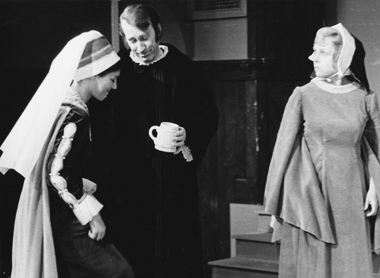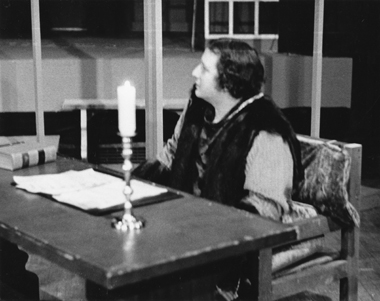|
From the Aberdeen World
- Inspiring performances in new Driftwood
play
- By Betty Butler
- World Staff Writer
-
In this age of Watergate and related horrors, it
is difficult for even the virtuous among us to understand a
conscience strong enough to carry its owner to the gates of
death.
-
If one is to believe what playwright Robert Bolt
says in "A Man For All Seasons," which opened last night at the
Driftwood Playhouse in Hoquiam, men of such conscience have
always been rare. That is why Sir Thomas More, Lord Chancellor
of England during the reign of King Henry VIII, was beheaded.
And also why history has always remembered him.
-
It's an inspiring theme, an inspiring
play---and inspiring performances by a large cast with whom it
is hard to find a fault.
-
John Wolfe has been seen in many roles on the Driftwood stage,
but Thomas More is far and away his best characterization, making
human, sympathetic and somehow understandable a man who, as noted
above, is basically difficult for weaker mortals to identify with.
-
It's far easier -- to easy -- to identify with The Common Man,
The Survivor, played with humor and complete cynicism by Mike
Bennett -- the great man's steward, the boatman, the jailer,
whatever role the moment requires of him in order to survive.
-
And there's Cromwell, whose machinations brought Sir Thomas to
the block. His total lack of scruples, and at the same time his
grudging admiration of the man he sought to destroy, were
subtly and effectively brought out by Mike Sturm.
-
Phyllis Shrauger, as Lady Alice More, a wife who could not quite
understand but only love, was responsible for one of the play's most
moving moments. Equally moving was the portrait of their daughter
Margaret drawn by Jennifer Sturm.
-
Dan Ayres' performance as Margaret's tempestuous suitor was good,
and even better to those who knew that he stepped into the role
midway through rehearsals.
-
John Eko was a believable King Henry even though he was far too
slim and good-looking to reconcile with the well-known Holbein
portrait of King Hal. Pat Early turned in a creditable performance
as Richard Rich, the ultimate opportunist. Ernie Ingram was
excellent as the bluff, less-than-brilliant but loyal Norfolk.
-
Performances of the smaller roles upheld the excellence of the
entire production -- for which Director W. James Brown can take
well-deserved bows. Bill Daves as Cardinal Wolsey, Bob Rutledge as
the Spanish ambassador and Jack Shrauger as his attendant, Hank
Bilderback as Archbishop Crammer, Mabs George as A Woman.
-
And kudos, too, to Bill Davis and Elsie Reynolds for outstanding
costumes, and to Brown for simple, suggestive rather than detailed
settings.
-
And when we conclude all this deserved praise, we return to the
play itself -- and an interesting, perhaps disconcerting question.
-
Why, when it's so easy for us to identify with the Common Man,
The Survivor and The Opportunist, do we poor humans go on through
the ages saving our respect, esteem and highest admiration for the
Sir Thomas Mores?
-
|

